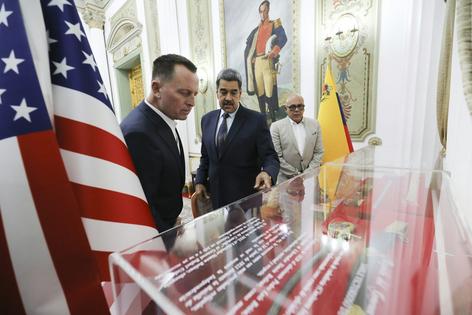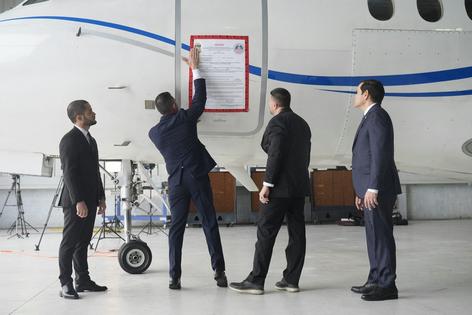Trump and Maduro refresh a complex relationship governed by self-interest and tainted by Venezuela election fraud
Published in Political News
In 2019, President Donald Trump recognized then-Venezuelan opposition leader Juan Guaidó as the country’s interim leader over Nicolás Maduro, who has ruled the country since 2013.
The policy, which led Venezuela to officially sever ties with the United States, was consistent with the first Trump administration’s policy of maximum pressure and a desire for regime change when it came to the socialist government in Caracas.
Fast forward six years: The early days of Trump’s second administration has seen the U.S. president negotiate with Maduro over the release of detained Americans and an apparent willingness from Venezuela to receive hundreds of thousands of its nationals being deported from the U.S.
As a diplomat who served in Venezuela and knew Maduro’s predecessor and mentor, Hugo Chavez, I detect a subtle shift in the evolving Trump administration’s policy toward Venezuela. It’s true that the administration retains a strong dose of the anti-Maduro posture it held last time, particularly in light of Maduro’s widely denounced election fraud in 2024 and an undercurrent of antipathy in Washington toward left-wing authoritarianism in Latin America.
But U.S.-Venezuela relations under a second Trump term are subject to other factors and dynamics, including Trump’s desire to be known for deal-making and the fulfillment of his campaign promise to deport immigrants back to Latin America. At the same time, Trump needs to balance satisfying anti-Maduro voices in his coalition with not pushing Venezuela further toward China, a country all too willing to exert greater influence in parts of Latin America.
So far, the second Trump’s administration seems to be sticking to the line of not officially recognizing Maduro and preferring his departure from the scene. It has kept sanctions on the country intact and continues to recognize Maduro’s opponent, Edmundo González, as the legitimate president-elect.
But that hasn’t stopped the administration from pursuing negotiations. In late January, Trump’s envoy Richard Grenell visited Caracas to secure the release of six Americans accused by Venezuela of plotting to destabilize the country. Trump subsequently announced that Maduro would accept repatriation of deportations of Venezuelans in the U.S. The U.S. administration also revoked the Temporary Protected Status, a categorization prioritized by President Joe Biden, for hundreds of thousands of people who fled Maduro’s Venezuela.
On Feb. 10, two Venezuelan planes returned home from the U.S with nearly 200 deported Venezuelan nationals, a signal that negotiations between the two nations were more than just optics. But news that the Trump administration has sent Venezuelan detainees to a U.S. military camp at Guantanamo Bay in Cuba – and is trying to send more – could yet prove a thorn in the side of any diplomatic thaw.
Regardless, the shift in stance on Venezuela has raised eyebrows among some Republicans and Democrats alike. Their concern is that Grenell’s visit – and overtures from the White House – gives Maduro’s regime a veneer of legitimacy.
But so long as Trump feels Venezuela under Maduro is useful to his aims of deportations, other U.S. issues with the government in Caracas are, I believe, likely to remain of secondary importance.
The complicated dynamic of two men, ideologically opposed but aware of the other’s usefulness, is reciprocated by Maduro. The Venezuelan leader congratulated Trump on his election victory in November, and he appears to treat his more powerful adversary with some pragmatism. But Maduro also remains willing to take a strident line rhetorically, even suggesting that Venezuela might “liberate” Puerto Rico if the U.S. keeps meddling with Venezuela’s affairs.
Rhetoric aside, Maduro – as evidenced by his apparent willingness to deal with the new administration on hostages and immigration – is likely to pursue self-interest where possible. And he will be well aware that the survival of his rule may be tied with his country’s economic situation.
Venezuela has been hit hard by U.S. sanctions that have been in place since 2017.
The level of poverty in the country is estimated to be around 80% of the population. This bleak economic picture is improving slowly but is still hampered by sluggish oil production despite having vast reserves.
Under Biden, the U.S. granted some exemptions for oil companies to work in Venezuela despite sanctions, helping the struggling export industry to recover some of its lost productivity.
Maduro will want to see where he can work with the Trump team to continue such allowances and avoid a full embargo. But recent noises coming from the administration have been mixed on this front. On Jan. 20, Trump suggested that he may pull the plug on Venezuelan oil exports to the U.S. “We don’t have to buy their oil. We have plenty of oil for ourselves,” he said.
Such a move would be a severe blow to Venezuela’s economy, which has benefited from increased exports to the U.S. in recent years. But the move will likely face resistance from oil producers like Chevron, the American company that has a license to operate in Venezuela.
It’s plausible Trump will be swayed by the elements of his base or administration who view Venezuela primarily in terms of a socialist authoritarian adversary to be defeated.
In 2024, Maduro pulled off one of Latin America’s great election frauds. Computer printouts had shown the opposition campaign of González and Maria Corina Machado won the July election by a landslide. And yet, Maduro declared himself the winner with no evidence.
Many in Trump’s circle viewed the fraudulent election as another reason for being hawkish toward the nation – a position that takes in both ideological and electoral considerations.
Trump knows there is a strong base of anti-communist Venezuelans in Florida who want to be tough on the Cuban-aligned government of Maduro. The new U.S. administration’s deportation policy has already concerned some among this strongly Trump voting base; any relaxation on Maduro could be seen as a further “betrayal.”
And Trump has appointed several people who have long been critical of Maduro, including his national security adviser, Mike Waltz, and Secretary of State Marco Rubio.
Rubio, in particular, is a longtime critic of any accommodation with Venezuela. He has spoken to opposition leaders, called González the legitimate president, blasted any relaxation of sanctions and, during his confirmation hearing, labeled Maduro’s government “a narco-trafficking organization.”
And while U.S. envoy Grenell has been shaking hands with Maduro, Rubio has been seizing the Venezuelan leader’s aircraft. On Feb. 6, the U.S. secretary of state personally oversaw its confiscation while visiting the Dominican Republic, where it had been impounded since last year.
During his first administration, Trump failed in his efforts to encourage the replacement of Maduro.
In any case, the Venezuelan government under Maduro, like Chavez before him, has shown itself capable of withstanding U.S. pressure.
Throwing a further wrinkle to any U.S. intentions of influencing the future of Venezuela is the role China has taken on in the country and Maduro’s increasing closeness with Beijing. In contrast to leaders in the West, China’s president, Xi Jinping, congratulated Maduro following the latter’s claim of victory in 2024. China is the leading importer of Venezuelan crude oil and has signed a series of bilateral trade and tourism pacts that have provided Maduro an economic lifeline.
To some U.S. hawks, China’s influence with Maduro represents a breach of a long-standing vision of the U.S. as a regional hegemony, as envisioned by the Monroe Doctrine. Yet other voices within the administration – including Trump, who has spoken positively about diplomatic overtures to Beijing, or Elon Musk, who has extensive business interests in China – view the country in far different terms than predecessors.
Ultimately, whatever path Trump chooses on relations with Venezuela is likely to be conditioned on what factions win out in his administration and which political constituencies the president is most keen to please.
This article is republished from The Conversation, a nonprofit, independent news organization bringing you facts and trustworthy analysis to help you make sense of our complex world. It was written by: Paul Webster Hare, Boston University
Read more:
Massive protests erupt again over disputed Venezuelan elections – but they look different this time
US sovereign wealth fund: A feasible idea to invest strategically, or a giant opportunity for waste?
What is Temporary Protected Status? A global migration expert explains why the US offers some foreign nationals temporary protection
Paul Webster Hare does not work for, consult, own shares in or receive funding from any company or organization that would benefit from this article, and has disclosed no relevant affiliations beyond their academic appointment.
































































Comments